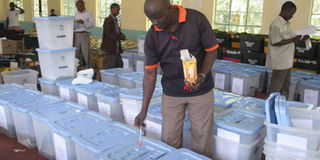All government agencies expected to make election come to pass

Ballot boxes in Alego Usonga on October 16, 2013. PHOTO | TOM OTIENO | NATION MEDIA GROUP
What you need to know:
The General Election will undoubtedly be Kenya’s biggest event in the New Year with focus now trained on the electoral commission, political leaders, the Judiciary, the media and the civil society.
When the new leadership takes over at the Independent Electoral and Boundaries Commission (IEBC) in the early weeks of 2017, this will set the pace for the steps needed to secure and inspire confidence in what will arguably be Kenya’s most competitive election yet.
The Constitution provides that the General Election should be held on the second Tuesday in August of every fifth year. In 2017, that date will fall on August 8. As such, all government agencies will be expected to make this constitutional requirement come to pass.
The General Election will undoubtedly be Kenya’s biggest event in the New Year with focus now trained on the electoral commission, political leaders, the Judiciary, the media and the civil society.
When the new leadership takes over at the Independent Electoral and Boundaries Commission (IEBC) in the early weeks of 2017, this will set the pace for the steps needed to secure and inspire confidence in what will arguably be Kenya’s most competitive election yet.
Already, a nine-member selection panel has nominated two people for the post of chairperson and nine others for commissioners. President Uhuru Kenyatta will then nominate one person as chairperson – either Mr Tukero ole Kina or Mr Wafula Chebukati – and six as commissioners for approval by Parliament.
The seven commissioners including the chairperson will be charged with managing the elections that the Opposition Cord has said must be conducted electronically. For the IEBC and its new leadership, the biggest – and arguably the only – agenda in 2017 will be to ensure a free, fair, transparent and credible elections.
Should there be a dispute over the outcome of the election, the new Chief Justice, Mr Justice David Maraga, and his team in the Judiciary, will be expected to step up to the plate and resolve the dispute judiciously and expeditiously.
POSSIBLE PETITION
Mr Justice Maraga has already said that the reconstituted Supreme Court is ready for a possible presidential petition and has asked Parliament to fund it with this in mind.
Outside government, religious and civil society leaders are expected to play a critical role in the 2017 election.
Already, religious leaders have said that hate mongers and those that have been involved in corruption should not be on the ballot in the 2017 elections. They also played a critical part in bringing the two rival political camps to the negotiating table to strike a deal on the exit of the current crop of electoral commissioners, led by Mr Issack Hassan.
“We as religious institutions assure Kenyans that we will continue to provide impartial civic and voter education so as to enable people participate in governance of the country,” the Inter-Religious Council of Kenya said in a statement early this month, signalling the role the clerics intend to play in the New Year.
The civil society will, undoubtedly, play as big a role
President Kenyatta, in his Jamhuri Day speech, fired the first salvo against civil society groups, saying that they were receiving money from external sources to influence Kenya’s electoral choices “in the guise of promoting good governance and civic education”.
One week later, a Sh2 billion United States-funded programme ran by the International Foundation for Electoral System, which has been operational since 20012, was stopped after the government said the NGO was operating in the country illegally.
This triggered an outcry by ambassadors including Robert Godec of the US who said that their countries’ intentions was only for free and fair elections. The UN has since weighed in on the debate.





